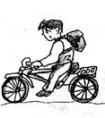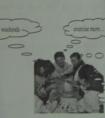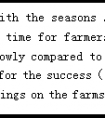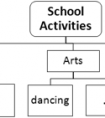We sometimes call the lion “the king of the jungle” Because it is stronger and more dangerous than other animals.小题1:It is the highest animal in the land food-九年级英语
题文
| We sometimes call the lion “the king of the jungle” Because it is stronger and more dangerous than other animals.小题1: It is the highest animal in the land food chain. In the sea,the shark is one of the animals at the top of the food chain. It can swim faster than most other sea小题2: 小题3:People are! We are not the biggest or fastest.but we are the cleverest. We could not run faster than cheetahs, so we invented cars and now we can move the fastest. We could not fight better than joins. so we invented puns. Now we ran hunt the best-People’s inventions are clever, but they can be dangerous,too.For example, people invented lactones, and now they make the air and rivers dirty. 小题4:Dirty rivers kill fish. hen bears cannot eat the fish and die. If we kill one part of the food chain. other parts also die. Remember that we are a part of the food chain. so we are in danger, too! 小题5: We should and we could do something for the world!
|
答案
小题1:E 小题2:B 小题3:D 小题4:C 小题5:A |
小题1:后句的含义为狮子是食物链中最高的动物,所以本句的含义为它跑的比许多动物都快,它是最佳的猎手,故本句空格处选E。 小题2:上句的含义为鲨鱼是食物链中的顶端之一,所以本句的含义可以为鲨鱼用它的牙齿来吃东西,故本句空格处选B。 小题3:后句的含义为人类是世界上所有食物链最顶端,所以本句的含义是什么处于食物链的最顶端,故本句空格处选D。 小题4:后句的含义为脏水会使鱼死亡,熊吃了鱼也会死亡,所以本句的含义可以为这可能会使糟糕可怕的事情发生,故本句空格处选C。 小题5:上句的含义为记住它们是食物链的一部分,所以我们也濒临危险,所以本句的含义为保护动物就是保护我们自己,故本句空格处选A。 |
据专家权威分析,试题“We sometimes call the lion “the king of the jungle” Because ..”主要考查你对 问答题,连词成句,日常用语、谚语,情景交际 等考点的理解。关于这些考点的“档案”如下:
问答题连词成句日常用语、谚语情景交际
考点名称:问答题
- 问答题:
主要是根据前提问题来做出相应的要求内的答案,题型比较灵活但是考查了学生多方面的知识和技能。 - 要做好这类题,就要注意平时知识的积累,包括单词、词组、句型等。
考点名称:连词成句
- 连词成句:
即是把错乱排列的词语根据语法或句法特点排列组合成为句式整齐,内容恰当,语气流畅的句子的方法。
他基本的要求是句子完整和流畅没有语法错误,更不要有语病。 连词成句题做题技巧:
首先强调第一个单词的第一个字母要大写,其次句子的最后要有标点符号。然后分句型来做:
1. 陈述句的时候,先找主语,然后找动词,再找其他,记得时间和地点是放在后面的。
2. 疑问句时,有疑问词的情况下找疑问词,然后找助动词,找主语,找其他。没有疑问词的情况下,就找助动词/be动词,再找主语,找其他。
3. 做这一类型的题目时,学生要有一定的基础,会认读单词,熟悉基本句型。
具体可以分一下几步来完成:
一、看清标点符号
1.如果是句号,则是陈述语句。陈述句的基本结构就是主语+谓语+宾语而构成的。
2.如果是问号,则是疑问语句。要先看是特殊疑问句还是由情态动词引导的疑问句。
①如果有where 、what、how等疑问词,那么它就是特殊疑问句,就要把疑问词where 、 what、 how 等放在一句话的最前面,它后面紧接的是be动词也就是我们学习过的am、is、are三个单词。
②如果题目中有can、 may、shall、would等情态动词,那么它就是由情态动词引导的疑问句。
例如:“have I a may new bike (?)” 。这道题目中有一个情态动词may,很显然这就是由情态动词may引导的疑问句。那么我们就要把may放在句子的最前面,后面紧接的就是这句话的主语(主语往往是人或者物)。
很快我们就能写出这句话的前半部分“May I have …”很显然,还剩下的几个单词可以构成一个词组“a new bike”,那么将整句话连起来就是“May I have a new bike ?”(我可以拥有一个新的自行车吗?)。
同样其他的句子,例如:由can 、would、shall等情态动词引导的句子也是这样的方法可以完成。
③如果题目中没有任何的特殊疑问词,也没有任何情态动词,那么它就是我们最最熟悉的一般疑问句了。
例如:“you a are student(?)”。很显然是一个疑问句,而且没有任何特殊疑问词。所以这是一句一般疑问句,一般疑问句的基本准则就是疑问词是be动词(am /is/are),而且要把它们放在句子的最前面。
通过观察我们看到题目中有一个be动词(are),所以这句话就很容易连到“Are you a student ?”(你是一个学生吗?)。
这样的题目还可以先将它当作一般陈述句来做,然后再由陈述句改成一般疑问句。
例如“you a are student(?)”这题还可以先将它写成一般陈述句的形式“You are a student.”。
然后将它写成一般疑问句,即是将这句话的主语和谓语(be动词)对调,得到“Are you a student?”,这样这句话也就完成了。
3.如果是感叹号,则是感叹语句。
①由what引导的感叹句。
我们知道有what引导的感叹句,其基本结构是What + a + adj. + n.。
例如:“What a nice book !”(多漂亮的一本书啊!)
② 由how引导的感叹句。
与what引导的感叹句相似,how引导的感叹句的结构是“How + adj.( +n. /名词短语 + be动词 )!”。二、注意特殊句型
还有一些连词成句的题目看上去似乎是无规律可循。
有这样一个题目:“to time to go it’s school (.)” 这样的题目就要求学生对有些句型的熟练掌握。
- 最新内容
- 相关内容
- 网友推荐
- 图文推荐
| [家长教育] 孩子为什么会和父母感情疏离? (2019-07-14) |
| [教师分享] 给远方姐姐的一封信 (2018-11-07) |
| [教师分享] 伸缩门 (2018-11-07) |
| [教师分享] 回家乡 (2018-11-07) |
| [教师分享] 是风味也是人间 (2018-11-07) |
| [教师分享] 一句格言的启示 (2018-11-07) |
| [教师分享] 无规矩不成方圆 (2018-11-07) |
| [教师分享] 第十届全国教育名家论坛有感(二) (2018-11-07) |
| [教师分享] 贪玩的小狗 (2018-11-07) |
| [教师分享] 未命名文章 (2018-11-07) |






